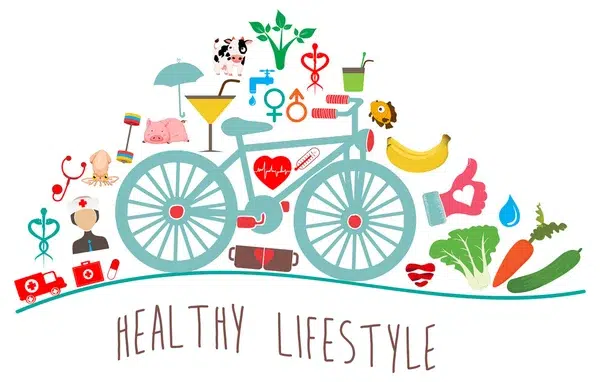Medical Health : Lifestyle is more than just how we live. It shows who we are as individuals or part of a group. What we choose in our lifestyle really affects our health. The World Health Organization says 60% of our health comes from our daily choices. If we eat poorly, don’t move enough, smoke, or use drugs, we can get seriously ill. This can cause heart problems, diabetes, obesity, and even cancer. These are known as “lifestyle diseases.” They are a big problem all around the world, making many people sick or die too soon. They also cost a lot for healthcare.
Key Takeaways
- Lifestyle choices have a significant impact on health and wellness.
- Unhealthy lifestyle behaviors can lead to chronic diseases like heart disease, diabetes, and cancer.
- Lifestyle diseases are a major public health concern globally, causing increased morbidity, mortality, and healthcare costs.
- Understanding the relationship between lifestyle factors and health outcomes is crucial for promoting overall wellbeing.
- Adopting healthier lifestyle habits can help prevent the development of chronic diseases and improve quality of life.
Introduction to Lifestyle Choices and Health
Lifestyle choices are key to our health. They include what we eat, how active we are, our sleep, substance use, and sex habits. These habits can boost or hurt our health.
The Relationship Between Lifestyle and Health
The connection between our choices and health is deep. Things like not eating well, not moving enough, smoking, or drinking too much can lead to heart problems or diabetes. Yet, choosing a healthy lifestyle can prevent many of these issues. A healthy diet, staying active, and steering clear of harmful activities are big helps. By choosing wisely, we protect our health.
“Healthy living is a journey, not a destination. It’s about making small, sustainable changes to your lifestyle that can have a big impact on your overall well-being.”
It’s vital to know how our lifestyles affect health. Learning this helps us make better choices and prevent diseases. This knowledge can lead to a healthier life.
Diet and Body Mass Index

Eating well is key for being healthy and avoiding chronic diseases. A diet full of fruits, veggies, and whole grains is good. It lowers the chance of heart disease, type 2 diabetes, and some cancers. However, too much processed food can lead to obesity and other health problems.
The Importance of a Healthy Diet
Focusing on a healthy diet helps a lot. Eating plenty of plants, lean proteins, and good fats benefits your health. This kind of diet can help control your weight and keep diseases away. It’s a great way to fight off sickness.
The Impact of Obesity on Health
Being obese is very risky for your health. It makes you more likely to have heart trouble, type 2 diabetes, and certain cancers. It can cause other issues like trouble sleeping and bad joints. A balanced diet and exercise help a lot in staying healthy.
Obesity is becoming a bigger problem because of how we live. Choosing bad foods and being lazy are main reasons. But, by eating well and moving more, you can keep a good weight and avoid the problems linked to obesity.
“A healthy diet is not about strict limitations, staying unrealistically thin, or depriving yourself of the foods you love. Rather, it’s about feeling great, having more energy, and stabilizing your mood.”
Impact of Exercise on Health

Being active is key to staying healthy, benefiting both body and mind. Activities like aerobic, strength, and flexibility exercises lower the chances of getting diseases. These include heart disease, stroke, type 2 diabetes, and cancer. Exercise boosts your heart health, makes muscles and bones stronger, and helps your immune system. Plus, it helps keep your weight in check to avoid obesity-related problems.
Exercise isn’t just good for your body; it’s also great for your mind. It can help with depression and anxiety, as well as improve sleep and thinking. This is because it releases happy chemicals in your brain and lowers stress.
The World Health Organization says adults should aim for 150 minutes of moderate or 75 minutes of intense exercise each week. Options include walking, biking, swimming, or joining fitness classes. Making exercise a part of your daily life can help prevent chronic diseases and keep you fit. It ensures you get all the benefits of exercise for your health in the long run.
“Regular physical activity is one of the most powerful preventive measures we have against many common and costly health problems.”
| Health Benefits of Exercise | Potential Risks of Physical Inactivity |
|---|---|
|
|
The Role of Sleep in Maintaining Health

Getting enough good sleep is key to a healthy life. Sleep health is vital for your body and mind. It includes not just how much you sleep, but the quality of your sleep too. Getting restful sleep lowers your chances of serious health problems, like heart disease and type 2 diabetes.
But, if you face issues like insomnia or irregular sleep, it can harm your health. These sleep disorders can lead to other health problems. They might make it harder for you to think clearly, and affect your emotional well-being.
Sleep Disorders and Health Consequences
If you don’t sleep well, it can impact your health in many ways. Some risks include a higher chance of heart disease, type 2 diabetes, and getting sick often. It can also make it tough to focus or remember things. Plus, it might lead to mental health issues like feeling depressed or anxious.
It’s important to have good sleep habits. This means going to bed and waking up at the same time every day. It also means making sure your sleeping area is relaxing and quiet. These steps can help you stay healthy and lower your risk of diseases.
“Sleep is the golden chain that ties health and our bodies together.”
– Thomas Dekker
Focusing on sleep health and dealing with sleep disorders is important. It helps improve your medical health and fight off diseases. Living a life that promotes good sleep can benefit your body and mind a lot.
Sexual Behavior and Its Impact on Health
 Maintaining good sexual health is very important to our well-being. Having positive sexual connections and a healthy sex life can make us physically, emotionally, and socially well. But, risky or harmful sex practices, like not using protection or having many partners, can lead to health issues. These include sexually transmitted infections (STIs) and reproductive problems. Safe, consensual sex is crucial for good sexual health. Not using protection during sex can spread STIs, harming your health. Having multiple sex partners without caution adds to this risk. So, it’s key to protect yourself.
Maintaining good sexual health is very important to our well-being. Having positive sexual connections and a healthy sex life can make us physically, emotionally, and socially well. But, risky or harmful sex practices, like not using protection or having many partners, can lead to health issues. These include sexually transmitted infections (STIs) and reproductive problems. Safe, consensual sex is crucial for good sexual health. Not using protection during sex can spread STIs, harming your health. Having multiple sex partners without caution adds to this risk. So, it’s key to protect yourself.
Use condoms and get tested regularly for STIs to keep safe. Talking openly with partners about your history and concerns is also vital. If you have any health worries, don’t wait to talk to a doctor or a nurse. Good sexual choices also affect our ability to have kids. Risky sex behaviors may cause unintended pregnancies. This could impact your physical, emotional, and financial health.
Therefore, making wise sexual choices is important. It helps keep you and others safe from STIs and other issues. By taking care of your sexual health, you can enjoy healthier relationships. This reduces the harm from risky sex behaviors.
“Sexual and reproductive health is a state of complete physical, mental and social well-being in all matters relating to the reproductive system. It implies that people are able to have a satisfying and safe sex life, the capability to reproduce, and the freedom to decide if, when, and how often to do so.”
Substance Abuse and Its Effects on Health
 Substance abuse is a major public health issue. It covers the use of tobacco, alcohol, and illegal drugs. These habits can lead to serious health problems. For example, smoking is a leading cause of lung cancer and heart disease.
Substance abuse is a major public health issue. It covers the use of tobacco, alcohol, and illegal drugs. These habits can lead to serious health problems. For example, smoking is a leading cause of lung cancer and heart disease.
Smoking and Health Risks
Smoking is a top preventable cause of death and sickness. It’s connected to lung cancer, heart disease, and COPD. Quitting can greatly improve health. This lowers the risk of major diseases and promotes better living.
Alcohol and Drug Abuse
Too much alcohol and drugs can hurt your health badly. Drinking heavily can damage your liver and cause cancer. It also leads to mental health issues like depression. Illicit drugs can be even worse. They can addict you, harm your organs, and cause various health problems.
For both alcohol and drugs, misuse can trigger chronic diseases. It also brings down your general health. It’s important to tackle substance abuse with preventive and treatment efforts. This helps people live healthier lives and lessens the impact of chronic diseases on communities. To conclude, the health impact of substance abuse is a major issue. It calls for a combined effort to educate, treat, and reduce harm. By doing this, we can make our communities healthier and safer places.
Impact Medical Health

Our daily choices really matter for our health. Things like what we eat, how active we are, if we smoke, and other habits can make us sick. These choices link to big health problems such as heart disease, stroke, diabetes, and some cancers. They make healthcare costs go up and affect many people’s lives.
But if we choose wisely, we can keep many diseases at bay. Eating well, moving often, sleeping enough, and staying away from danger help a lot. It’s key for public health to promote good habits and change bad ones. This can cut down the number of sick people and how much we spend on healthcare.
The connection between our lifestyle and health is clear. Bad habits can cause serious illnesses like heart issues, strokes, and diabetes. Not only do these problems hurt individuals, but they also strain our healthcare systems. Yet, living healthily can lower the odds of getting sick. Exercise, good food, and steering clear of danger help keep us well. This is a powerful way to prevent illness and feel good every day.
| Unhealthy Lifestyle Factors | Potential Health Consequences |
|---|---|
| Poor Diet | Obesity, heart disease, type 2 diabetes, certain cancers |
| Physical Inactivity | Obesity, heart disease, type 2 diabetes, certain cancers |
| Smoking | Lung cancer, heart disease, stroke, COPD |
| Substance Abuse | Mental health issues, organ damage, addiction, overdose |
Choosing a healthy route is crucial. By promoting health and changing risk factors, we can do a lot. We can lower disease numbers, better everyone’s health, and spend less on healthcare.
“Investing in prevention is crucial to reducing the burden of chronic diseases and promoting overall health and wellness.”
Medication Abuse and Misuse
Medication abuse and misuse pose serious health risks. Self-medication is a big issue. It happens when people take medicines on their own, without a doctor’s advice or a prescription. This can cause a lot of problems, like bad reactions, building a tolerance to the medicine you need, or even serious health risks that could be life-threatening.
Using too much or the wrong prescription drugs like painkillers or anxiety pills can lead to addiction and other health problems. It’s very important to tackle medication abuse and encourage the right use of medicines. This helps protect everyone’s health.
The Risks of Self-Medication
Self-medicating is risky because you’re not getting advice from doctors. So, people might:
- Mix medicines that shouldn’t be mixed, causing bad effects
- Take too much, which could be dangerous
- Become addicted to certain medicines
- Not find out about or treat serious health problems soon enough
Plus, using prescribed drugs the wrong way—like not having a prescription or using too much—can seriously harm your health.
“Medication abuse and misuse can have serious, even life-threatening, consequences. It’s essential to work closely with healthcare providers to ensure the safe and responsible use of all medications.”
Being aware of the dangers of medication abuse helps us make better choices. It’s important to get help from professionals and to stick to the advice they give you. This way, everyone can stay as healthy as possible.
Also Read : Short-Term Vs Long-Term Prognosis In Severe Infectious Diseases
The Influence of Modern Technology on Health
Modern technology advances quickly, with smartphones, computers, and digital devices used everywhere. However, using these devices too much can harm our health. For example, spending too much time on screens can make it hard to sleep well, move our bodies enough, and stay mentally healthy.
Digital screens emit blue light. This light can mess up our body’s sleep cycle, leading to sleep problems and hurting our health in other ways. Also, sitting a lot while using technology makes us less physically fit and more likely to get sick with certain diseases.
In this digital era, we need to be smart about how we use technology to stay healthy. It’s important to set limits on screen time, take breaks, and stay active. Balancing tech use with a healthy lifestyle helps us avoid the bad side effects and enjoy technology more.





